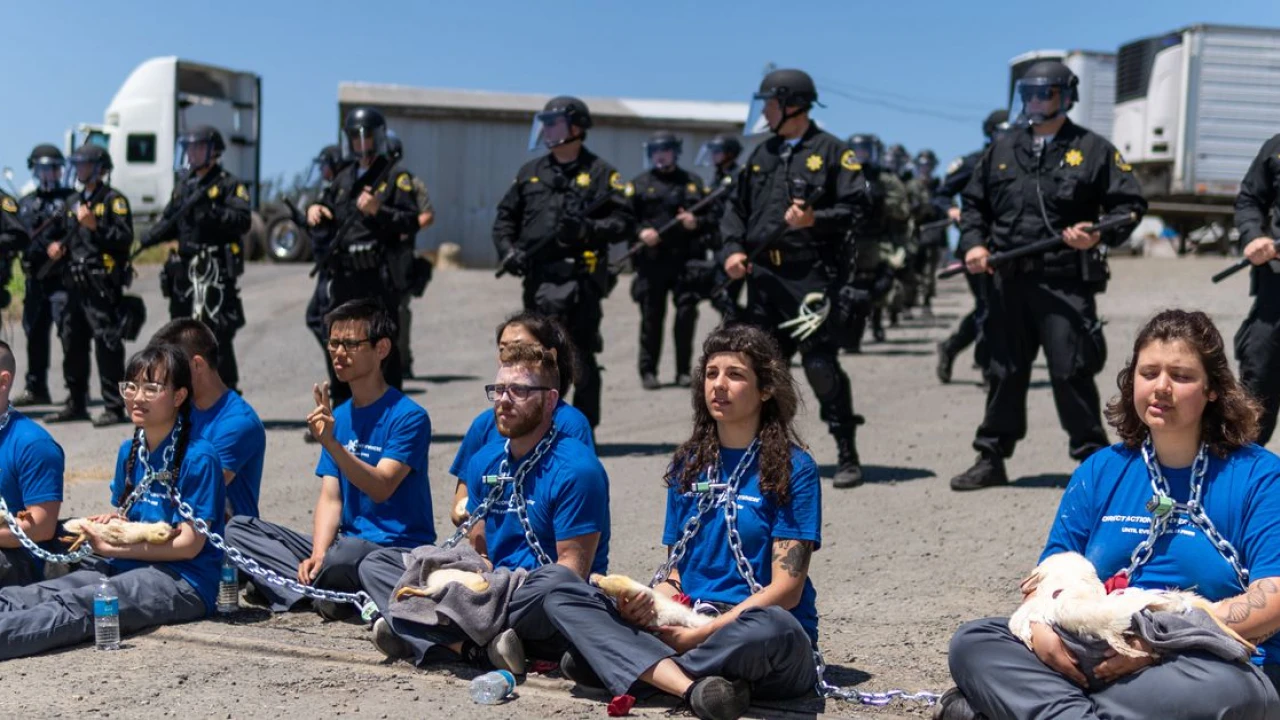Regional
You’re more likely to go to prison for exposing animal cruelty than for committing it
California could send Wayne Hsuing, attorney and co-founder of Direct Action Everywhere, to prison for 3.5 years for rescuing chickens and ducks from cruelty. Where does the animal welfare movement go from here?

Wayne Hsiung, an attorney and leading figure in the animal rights movement, was convicted of two counts of misdemeanor trespass and one count of felony conspiracy to trespass last week, after six days of deliberation by a jury in Santa Rosa, California, about an hour north of San Francisco. The case emerged from Hsiung’s role in helping lead two mass protest actions in 2018 and 2019, in which activists removed 70 chickens and ducks from two Sonoma County factory farms: Sunrise Farms, a major egg supplier, and Reichardt Duck Farm. Activists took the animals to receive veterinary care and ultimately to live at animal sanctuaries.
The conviction represents a major turning point for the group Hsiung co-founded in 2013, Direct Action Everywhere (DxE), which has become an increasingly important part of the animal rights movement. DxE is known for its bold, uncompromising tactics, including a practice it calls “open rescue,” in which activists enter factory farms, slaughterhouses, and other places where animals are exploited for profit, film conditions there, and rescue animals who are especially sick or suffering. Open rescue represents both a utopian ideal — directly liberating animals from suffering and slaughter — and a pragmatic legal strategy. With these tactics, the activists openly invite prosecution, hoping to flip the script of a criminal trial by presenting evidence of animal cruelty to the jury and arguing that their actions were not only defensible, but necessary. Success, they hope, would set a legal precedent in favor of intervening to help animals suffering in the factory farm system.
Before Hsiung’s conviction last Thursday, DxE had had a surprising run of success with these trials. Hsiung and DxE member Paul Darwin Picklesimer were acquitted in a historic trial in October 2022 for rescuing two sick, suffering piglets from a massive Smithfield Foods factory farm in Utah. Then, in March of this year, activists Alicia Santurio and Alexandra Paul were acquitted in California for removing two chickens from a truck outside a slaughterhouse owned by Foster Farms, a major chicken producer. In both trials, defendants argued that they had taken animals who were in such ill health that they had no commercial value to their owners. In interviews after the Smithfield trial, jurors have said they were horrified by arguments made by prosecutors, comparing animals to inanimate property.
Until now, no DxE activist had been sentenced to jail time for an open rescue. That’s about to change. Hsiung is now being held in jail at least until his sentencing hearing on November 30 (like many other people detained in Sonoma County, he’s only allowed to leave his cell for 30 minutes per day, DxE communications director Cassie King told me). Attorneys in the case say he could face up to three and a half years in prison. Normally, a defendant might receive a shorter sentence if they express remorse for their crimes — but that is something Hsiung is exceedingly unlikely to do. “What we have done to these gentle creatures on this earth is, in both scale and severity, the greatest source of terror and suffering in the history of our species. And I do not regret or apologize for my efforts — our efforts — to combat this grave injustice,” he wrote in a post published on his blog shortly after his conviction.
:no_upscale()/cdn.vox-cdn.com/uploads/chorus_asset/file/25069404/Wayne_Hsiung_talking_to_sheriff.jpg)
:no_upscale()/cdn.vox-cdn.com/uploads/chorus_asset/file/25069405/2023.09.08_Close_up_of_supporters_on_first_day_of_trial.jpeg)
Hsiung’s trial and conviction show the extraordinary difficulty of trying to discuss what happens to animals on factory farms in a legal system that only sees them as property. At both factory farms in this case, DxE had documented gruesome conditions prior to their open rescue actions and had submitted animal cruelty complaints to authorities (though no action was taken by legal officials, King said). Yet it was the activists, not the farm owners, who were criminally charged and had to explain themselves to a jury. Laura Passaglia, the Sonoma County Superior Court judge who presided over the trial, barred Hsiung from showing most evidence of animal cruelty, depriving him of the ability to show his motives for entering the farms.
“The law is creating a double standard by which the corporations are not held accountable and a person who’s charged with trespass is,” Justin Marceau, a law professor at the University of Denver who runs a clinic representing animal activists and plans to work an appeal of Hsiung’s trial, told me. “A big feature of these trials has been the opportunity to expose the lawlessness of the industry and juxtapose that with the trivial infractions by people who are rescuing animals … When you aren’t able to make that contrast for the jury, it’s a lot harder to win.”
DxE’s members and supporters, and the larger animal rights community, are only beginning to grapple with what Hsiung’s incarceration will mean for the movement. For a while, DxE’s groundbreaking recent victories had made the movement feel “invincible,” Dean Wyrzykowski, co-founder with Hsiung of open rescue group the Simple Heart, told me. Although Hsiung had long known that going to prison was a possibility — even an inevitability, given the number of cases he’s been involved in — many of his supporters were shocked and dismayed after his conviction came in.
The verdict hearkens back to the 2006 federal convictions of six activists who had campaigned against the animal testing company Huntingdon Life Sciences — a hugely demoralizing moment for the animal rights movement that for a time pushed its tactics in a more moderate direction. “That conviction really shut off all kinds of civil disobedience and direct action in the US,” Marceau said — until DxE came around.
DxE’s provocative mass rescues
At the heart of this trial were two mass actions, each drawing hundreds of activists, at the culmination of DxE’s annual Animal Liberation Conferences in 2018 and 2019.
In the first action, in May 2018, activists removed 38 chickens from Sunrise Farms, an egg company that at the time housed about 800,000 hens across its locations and supplied eggs to retailers including Whole Foods, Costco, Trader Joe’s, and Walmart. In the second action, in June 2019, activists rescued 32 ducks from Reichardt Duck Farm, an operation that slaughters more than a million ducks for meat each year.
:no_upscale()/cdn.vox-cdn.com/uploads/chorus_asset/file/25069364/A_bird_dead_on_the_floor_at_Sunrise_2018_investigation__1_.png)
:no_upscale()/cdn.vox-cdn.com/uploads/chorus_asset/file/25069366/A_duck_trying_to_move_at_Reichardt_2019_investigation__1_.png)
Before both actions, smaller groups of DxE activists had entered Sunrise and Reichardt facilities and documented what they said were grisly conditions. At Sunrise, activists found hens that were dead, dying, had serious injuries like prolapsed reproductive tracts, and had mangled feet that got stuck in the wire of their cages and prevented them from moving (since then, Sunrise has gone cage-free across all of its locations after a California welfare law, Prop 12, took effect). They also found some birds with their eyes pecked out from what they believe was cannibalism.
Reichardt Duck Farm had been the subject of a widely publicized undercover investigation by the farm animal welfare organization Mercy for Animals in 2014, which showed the ducks having their beaks seared off without anesthesia, and living on wire floors in dark, crowded sheds, never allowed to swim in water. Some ducks were found stuck on their backs and unable to reach food or water, while others were culled by having their necks snapped by workers. In 2019, DxE investigators entered Reichardt several times and found similar conditions, with ducks that were dead, wounded, or stuck on their backs and unable to right themselves, and dumpsters full of dead ducks on the property.
Before their mass actions, DxE sent reports of their investigations at both Sunrise and Reichardt to the county sheriff, animal control, and other agencies, alleging that the farms were violating state animal cruelty law; the group says no action was taken by authorities.
At the 2018 action, for which Hsiung was convicted of trespass and conspiracy to trespass last week, a large number of activists arrived at Sunrise and stood on public property across from the farm in protest, while a smaller group of activists in biosecurity gear entered the sheds on the farm and took out hens. DxE had obtained a legal opinion from Hadar Aviram, a professor at UC College of Law, San Francisco, saying that the activists had a valid defense for their actions because California law allows defendants to argue that they were providing aid to suffering animals out of necessity. Hsiung didn’t personally remove any of the animals that day, but he declared the group’s intent to do so to Mike Weber, co-owner of Sunrise, and liaised with police when they arrived on the scene.
“There was a decapitated head of a chicken that was in one of the wire cages with other chickens,” Andrew Sharo, a computational biologist and a member of the group that removed hens from Sunrise, testified at Hsiung’s trial last month. “I found a hen that had essentially dried out, essentially mummified, as stiff as a board.”
Weber, who was at the Sunrise location when the action took place, told me he felt ambushed by DxE as activists pushed past employees to enter the facility, and that the event had a lasting negative effect on his staff. “I repeatedly asked [the activists], ‘What can I do to help? Why are you here?’ and they walked right past me,” he said. DxE’s statements about Sunrise, he said, made it sound like “there was blood everywhere, there was mass cannibalism, there were dead animals everywhere rotting in filth,” which he said was a misrepresentation of the farm.
“Do all of our chickens look horrible? No, they don’t,” Weber said. “Are there times when we have a dead chicken? Yes, there are. Are there times when a chicken has blood on it? Yeah, there is. But it’s an exception and not the rule.” But with DxE, he said, “there is no middle ground — their goal is to eliminate all animal agriculture.” (He’s right about that: The group wants to abolish the exploitation of animals for human purposes.)
The following year, at the Reichardt Duck Farm action, a large crowd of activists stood on public property while a smaller group entered the facility to rescue animals. DxE released a video of activists walking out of a shed carrying tiny, cheeping baby ducks, born into a system where they would have lived a few short weeks before slaughter. Another group entered Reichardt’s on-site slaughterhouse, removed ducks who were hanging upside down from shackles, due to be killed imminently, and locked themselves down to the slaughter line to prevent it from operating. At the entrance to the farm, activists removed dead ducks from a dumpster full of dead bodies on the property and sat cradling them, holding felt roses, in a kind of vigil. Dozens of police in riot gear surrounded them, eventually arresting nearly 100 people.
:no_upscale()/cdn.vox-cdn.com/uploads/chorus_asset/file/25069384/Activists_chained_to_front_with_dead_ducks_from_inside.jpg)
:no_upscale()/cdn.vox-cdn.com/uploads/chorus_asset/file/25069385/Riot_police_marching_in.jpg)
“I remember holding this duck, and her ribcage was showing, and she had this huge, gaping hole in her body and just was sitting there with her guts spilling onto my lap, and they stayed there as I was taken to jail,” Wyrzykowski told me about the Reichardt vigil. “I remember being held in jail with the guts of this bird on my clothing, my pants, and just sitting with tragic thoughts of what this bird must have gone through.”
Hsiung was convicted of trespass at Reichardt in last week’s trial verdict; although he didn’t directly participate in any of the actions there and testified that he was on public property the whole time, talking to police and to activists, the jury was instructed that he could still be convicted for aiding and abetting others’ trespassing. An additional felony conspiracy to trespass charge for the Reichardt action resulted in a hung jury.
Reichardt Duck Farm declined to comment for this story.
The defense believes it was prevented from making its case — and plans to appeal
Almost all the activists who participated in the Sunrise and Reichardt actions were either never criminally charged, had their charges dropped, or entered plea deals on very favorable terms. By late September of this year, only one defendant remained: Wayne Hsiung.
In DxE’s previous open rescue trials, activists defended themselves against theft charges — the theft of the animals they rescued — rather than trespass. Theft charges have opened the door for activists to show evidence of the health and physical condition of the animals they took, to try to persuade jurors that they were so sick that they wouldn’t have made it to slaughter, making them worthless to their owners — a defense that proved successful in DxE’s recent trials in Utah and Merced, California.
But before the Sonoma County trial, the Sonoma County district attorney’s office dropped all theft and burglary charges, including charges of “Grand Theft of Domestic Fowls” — even though many more animals were taken in this case than in previous ones. DxE believes this was a “cover-up” to prevent evidence of the condition of the animals from being shown to the jury. Hsiung was left with two counts of misdemeanor trespass (one each for Sunrise and Reichardt), a relatively minor crime that carries up to six months in jail, and two counts of felony conspiracy to trespass — far more serious than the crime of trespass itself.
“I think it’s totally outside the bounds of legal decency that you would charge someone with felony conspiracy for a misdemeanor,” Marceau said.
While the rationale behind the prosecution’s specific charging decisions may be hard to parse, it’s clear that Sonoma County law enforcement has close ties to local animal agriculture. At a 2019 event hosted by the Sonoma County Farm Bureau, an agribusiness lobby group, the Sonoma County sheriff’s office and district attorney’s office gave a presentation called “When the Protest Comes,” teaching farmers how to protect themselves from animal activists. “We take these crimes very seriously. We DO NOT issue citations. We book on Felonies if possible,” read the presentation slides, which were obtained by a public records request by DxE. “Work with Farm Bureau to make sure good legislation is in place for you,” it instructed the audience.
:no_upscale()/cdn.vox-cdn.com/uploads/chorus_asset/file/25068684/Screenshot_2023_11_08_at_1.20.46_PM.png)
The DA office’s involvement in the Farm Bureau event “was to provide the attendees with information about criminal law as it pertained to trespassing,” Sonoma County Assistant District Attorney Brian Staebell told Vox in an email. Staebell said his part of the presentation did not use these slides, though his name is listed on the first slide. “I wasn’t there to editorialize or support any particular group’s perspective … the relationship between our office and the Farm Bureau and the agricultural community is the same as our relationship with all of the citizens of Sonoma County.” The county sheriff’s office didn’t return a call requesting comment on the presentation.
With theft charges dropped, Hsiung, who represented himself in the trial, wasn’t able to show jurors almost any footage from inside Sunrise or Reichardt. Judge Passaglia ruled before trial began that most animal cruelty evidence would be excluded, but she allowed the defense to show images of sick or injured animals on a few occasions to directly refute the prosecution’s witnesses who claimed that such animals didn’t exist.
“The decision to disallow such evidence is usually made to benefit a defendant — not showing gruesome images of a murder victim, for example,” journalist Natasha Lennard pointed out in the Intercept after Hsiung’s conviction. But “such logic has been flipped in DxE cases, including Hsiung’s most recent, to the benefit of powerful agribusiness.” Meanwhile, prosecutors Robert Waner and Jessalee Mills questioned DxE members who served as defense witnesses about whether they were vegan, which Marceau argues may have violated the First Amendment ban on inciting animus based on someone’s belief system. (Marceau hopes to raise this issue on appeal.)
:no_upscale()/cdn.vox-cdn.com/uploads/chorus_asset/file/25068693/Courtroom_Sketch_of_Wayne_Hsiung_by_Katya_Gaidaeva.jpeg)
One of DxE’s major goals in its trials has been to win the right to present a “necessity defense,” in which a defendant argues that they had no option but to commit a crime to prevent a greater evil from occurring, like breaking into a hot car to save a baby or dog inside. This defense has sometimes been allowed in criminal trials involving political protests, like when anti-nuclear activists broke into nuclear weapons facilities, or more recently, when climate activists shut down fossil fuel pipelines in Minnesota.
But judges haven’t allowed DxE to use a necessity defense in any of its cases because such defenses are usually reserved for preventing harm to humans. Instead, the activists have largely relied on arguments about rescued animals lacking commercial value, but the drawback of this is that it reifies animals’ property status. The law sees animals as things, not as persons, making it very hard to talk about their experiences, their preferences, or their suffering in court.
This could change: A judge permitting a necessity defense for an animal would be a groundbreaking ruling, allowing activists to talk about animals’ needs on their own terms and take action to protect them. In August, Harvard Law School professor Kristen Stilt wrote an amicus brief for the Sonoma County trial, arguing that Hsiung should be allowed to make a necessity defense and that denying such a defense in an animal rescue case would be “absurd and irrational.”
Judge Passaglia didn’t allow her to file that brief, a decision that Marceau found baffling. An amicus brief “is an expert in the field opining and sort of notifying you, ‘Look, I think there’s something significant before your court,’” he said.
The upside of a guilty verdict, for DxE, is that it offers the opportunity to appeal to a higher court and set a binding precedent that moves the law in a more favorable direction for animals — something that isn’t possible in a lower court jury decision. DxE plans to appeal Hsiung’s conviction on issues including Passaglia’s denial of a necessity defense, and other decisions they believe were improper.
For example, Passaglia placed a gag order on Hsiung, barring him from talking to media during the trial, which was condemned as unconstitutional by UC Berkeley Law Dean Erwin Chemerinsky and by the ACLU of Northern California. She reprimanded the defense when she found out that members of DxE had been posting updates about the trial, eventually removing members of Hsiung’s defense team from the courtroom, multiple observers at the trial said. She also denied media requests to film inside the courtroom, including a request from Vox, which made the trial difficult to cover.
DxE’s philosophy confronts clashes with the criminal legal system
When the jury came back with Hsiung’s guilty verdict, he was immediately cuffed, without the opportunity to make a final statement to the court, and taken to jail without bail, where he remains indefinitely. I was struck by how easily this justice system was willing to take away someone’s freedom for the nonviolent crime of trespass, how much easier it is to get in trouble for helping animals than for caging and slaughtering them.
“It’s one of those moments where as a lawyer, you step back and you have second thoughts about your profession and the complicity of the legal system in what’s happening,” Marceau said.
To most people, it may be hard to understand why someone would risk incarceration to rescue a symbolic number of animals from a factory farm. Earlier this year, I asked a few DxE activists how they decided they could be okay with risking a felony conviction or a prison sentence. They said, simply, that they felt they had no choice but to intervene. If society was going to criminalize people for rescuing animals from grievous suffering, they couldn’t fathom agreeing to play by such a perverse set of rules.
The power of DxE’s philosophy is its refusal to compromise with a profoundly immoral system; now it has met a legal system that seems equally uncompromising, and as a result its most influential exponent, Hsiung, is behind bars.
“It’s a striking reminder that the consequences are real. They’re not hypothetical,” Marceau said. “This is a moment that every movement faces, and you sort of say, ‘Okay, do we retreat for a year or two years, do we slow down? Or do we double down?’’
One lesson from this conviction is that mass actions like the one DxE staged at Sunrise, with large numbers of activists pouring into a farm over the objections of employees, may not be very appealing to a jury. The group’s more understated, less combative actions — like taking two piglets from a terrible factory farm at night, without workers around — may garner more sympathy.
:no_upscale()/cdn.vox-cdn.com/uploads/chorus_asset/file/25068769/piglet_looking_up.jpg)
:no_upscale()/cdn.vox-cdn.com/uploads/chorus_asset/file/25068786/piglets.jpg)
DxE has already announced its next move: Right after Hsiung’s conviction came in, the group released new undercover footage, including two new open rescues, taken at Sunrise Farms and Reichardt Duck Farm while the trial was ongoing. “You do not scare us and we will not stop,” DxE lead organizer Almira Tanner posted on X. This week, the group publicly released its in-depth manual on how to conduct undercover investigations, signaling a desire to scale up this type of work.
“I think this [conviction] is lighting a fire in these activists that the US animal movement hasn’t previously experienced,” Marceau said. “I think people are angry and I think people see this as an injustice. And sometimes that’s the most powerful thing, is having this kind of injustice.”
That may be true — it’s hard to think of a social movement that’s succeeded without people who were unjustly persecuted but persisted in spite of it. But DxE will need to decide, as a group and as individuals, how much sacrifice it’s willing to bear.
-

 Regional 1 day ago
Regional 1 day agoIslamabad police net senior journalist Matiullah Jan in terrorism, drug case
-

 Weather 1 day ago
Weather 1 day agoSmog: Lahore again tops in air pollution
-

 Pakistan 2 hours ago
Pakistan 2 hours agoFederal govt cancels Saturday holiday in schools
-

 Crime 2 days ago
Crime 2 days agoDG Khan: Terrorists late night attack check post on Punjab-KP border
-

 Pakistan 2 days ago
Pakistan 2 days agoList revealed of injured, deceased brought to hospital in PTI protest
-

 Regional 2 days ago
Regional 2 days agoMaryam grateful to people of Punjab for not supporting anarchists
-

 Pakistan 2 days ago
Pakistan 2 days agoTop Chinese general, army chief Munir discusses matters of mutual interests, regional stability
-

 Pakistan 2 days ago
Pakistan 2 days agoBelarusian President, PM Shehbaz arrive in Murree


























